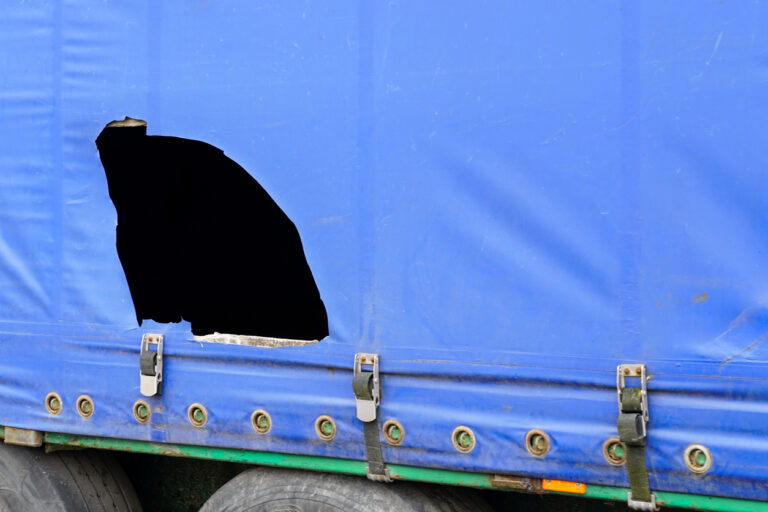Imagine a driver pulls into a truck stop, intent of freshening up with a shower, possibly food and a good night’s sleep before heading back out onto the road.
When the driver returns to the truck, nothing looks amiss, and they move on to the destination. But what happens when the doors to the trailer are opened and those ready to unload the cargo find the trailer empty?
That scenario has played itself in many different locations, as pointed out during a luncheon hosted by the Georgia Motor Trucking Association in Atlanta in late March.
According to the Federal Bureau of Investigation (FBI) there are four different types of cargo theft.
Straight cargo theft occurs when cargo is physically stolen from its current location. Cargo thieves often look for items they can steal and sell quickly. This often occurs at truck stops, parking lots, roadside parking, drop lots, rail yards and other situations where cargo is left unattended.
Strategic cargo theft occurs when thieves incorporate deceptive tactics to commit theft. This type of cargo theft involves the use of fraud to trick shippers, brokers, and carriers into handing loads over to thieves instead of the legitimate carrier. Other current strategic cargo theft trends include identity theft, fictitious pick-ups, account takeovers, double brokering scams, and fraudulent carriers as well as the implementation of a combination of these methods.
Cyber cargo theft occurs when basic types of cyberattacks are used to aid in committing cargo theft. The attacks include phishing emails that install Trojan Horse malware granting access to a company’s systems for thieves to retrieve sensitive data. Thieves then use this information to print out copies of legitimate shipping paperwork they can use to commit fictitious pick-ups.
Pilferage cargo theft occurs when criminals alter the bill of lading and pilfer small amounts off the truck.
Keith Lewis, vice president of Verisk spoke during the luncheon over a variety of topics including all-out theft.
The trends, as one might expect, are simply going up. In 2020, there were 1,781 reported according to Lewis. The current apex sits at 3,625.
Lewis says the hot beds of cargo theft continue to be the same five states: California, Texas, Florida, Illinois and Georgia. Since 2019, these five states have been in the top 5 for thefts. Though the bottom three of those states have varied over the last six years, California and Texas have remained steady in the top 2.
Average loss values are also going up from around $77K in 2019 to more than double at $161K in 2024.
How are bad actors getting to cargo? Several ways.
One being that the criminals are bold enough to pull up to a truck at a red light and place a GPS tracker on the trailer.
That allows thieves to follow more than one load.
Some thieves can impersonate a motor carrier in good standing through brokers or advertisements on platforms like Facebook.
Some potential thieves try to purchase existing phone numbers and emails associated to the MC or try to set up as many shipments as they can handle in the same area over a span of a few days, before too many reports can surface on review platforms.
Some that are skilled in dealing with GPS tracking – whether covert or through driver cell phone may submit an edited Proof of Delivery document to hide the shipment was stolen.
Lewis says reporting of theft can be skewed a bit as well as many drivers will not admit to being parked in a questionable lot, but there are ways to look up the address on Google
maps to determine where the actual parking took place. Being proactive when it comes to load tracking is an important part of prevention.
“You have to geofence the route,” Lewis said. “If he gets more than a mile outside the geofence, you have to get an alert. You’ve got to be involved.”
The FBI also has tips on how to keep cargo loads safe from thieves.
- Never leave loads unattended, especially in known cargo theft areas.
- Use high security rear door locks and air cuff locks.
- If it’s unavoidable to stage/drop a load, consider installing landing gear locks as well.
- Research contact information and company information thoroughly through the FMCSA, internet search engines, and third-party vetting services.
- Work closely with shippers to confirm positive identities of drivers at the point of pick up—including driver information, truck, and trailer identifier information—and use a secure pick-up number for security measures.
- When using online load boards, exercise increased caution and due diligence to verify the identities of people and companies you are contracting with.
Bruce Guthrie is an award-winning journalist who has lived in three states including Arkansas, Missouri and Georgia. During his nearly 20-year career, Bruce has served as managing editor and sports editor for numerous publications. He and his wife, Dana, who is also a journalist, are based in Carrollton, Georgia.







